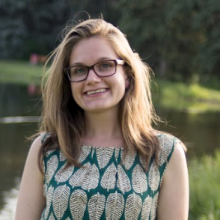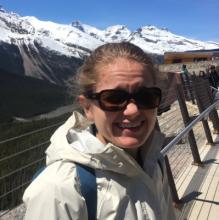Stéphanie La France
Why did you decide to pursue a graduate degree?
I decided to pursue a PhD for many reasons. I fell in love with research during my master’s at the University of Alberta. Having had the opportunity to read, think and write about curriculum and theory, I noticed many places where I could expand my own teaching practice, and share with my fellow colleagues. After much deliberation, I decided I wanted to engage with practitioners and students in a research capacity. I wanted to understand why and how we teach what we do, as well as the impact of mathematics education.
Why did you decide to study at UBC?
As one of the top universities in Canada, UBC offered depth and breadth of research explorations, as well as opportunities to connect with researchers at the cutting edge of the field of mathematics education and research methodologies in education.
What is it specifically, that your program offers, that attracted you?
My program will enable me to extend my master's work and foster connections with people within my field. The research emerging from the Faculty of Education at UBC is aligned with my goals to pursue innovative teaching and research practice. In addition, there are researchers in The Faculty of Education whom I admire and respect deeply.
What was the best surprise about UBC or life in Vancouver?
The best surprise about Vancouver is the moss on the trees in winter—it is so vibrantly green! At this point, I may have more moss photos than cat photos on my phone. On a related note, things about UBC that I have thoroughly appreciated include the beautiful outdoor spaces and the number of museums and galleries on campus.
What aspect of your graduate program do you enjoy the most or are looking forward to with the greatest curiosity?
I am most excited to get caught up on reading! I’ve collected many books and articles since beginning my research journey, so there is a lot to get caught up on. I have a wide array of interests in reading which fall under the general category of non-fiction. As for fiction, I am partial to speculative or science fiction, and fantasy.
What do you see as your biggest challenge(s) in your future career?
One thing I find to be a consistent challenge is combatting imposter syndrome. I am both surprised and excited to be where I am in my career, but I find I occasionally worry if I am here because of a sequence of very lucky situations. I love what I’m doing, I think my ideas are worth sharing and want to be here so badly, but I often get caught up in doubting whether or not my confidence is reasonable. Are my ideas actually good? Am I good enough to be here? I think it’s so important to be open and honest about fear and doubt. It is a more compassionate approach to just acknowledge doubts and proceed boldly anyway. Like Elyse Meyers said: do it scared!
How do you feel your program is preparing you for those challenges?
The program offers so many opportunities to connect with supervisors, course instructors, colleagues, and peers. In my experience so far, I have felt comfortable being vulnerable and honest about confidence hiccups and negative perceptions of self. I am reminded that research and teaching are practices; without practice, there can be no growth, and being part of a nurturing community can go a long way to cultivating that practice.
What aspects of your life or career before now have best prepared you for your UBC graduate program?
I was a practicing teacher in Alberta for eight years teaching Grade 7-9 mathematics in the French Immersion program. During my time teaching, I continuously sought to improve my teaching practice and advance equity and community flourishing with and through assessment in mathematics. I took some time away from my classroom to complete a thesis-based Master of Education at the University of Alberta, where I explored the barriers I was facing in implementing what I perceived to be ideal assessment practice and then used speculative fiction to imagine what my assessment practice could be if those barriers didn’t exist. This was an enchanting experience, and it informed my current PhD project.
What do you like to do for fun or relaxation?
I enjoy painting (mostly watercolour), macramé, getting outside, caring for my indoor plant collection, and reading. I like to get out and explore the city from time-to-time by wandering about without a particular endpoint in mind. To unwind after a long day, I like to journal or work through some math problems. It’s a great way to slow down.
What advice do you have for new graduate students?
Explore to your hearts' content, read outside of your field, make mistakes, be clumsy, and be compassionate toward yourself as you learn and develop as a student. Cultivate your 'why': why are you here doing what you are doing? Finally, remember that it is okay to change your ‘why’ and/or change your research topic....sometimes even more than once. In my master's, I changed my topic twice after my initial choice.

